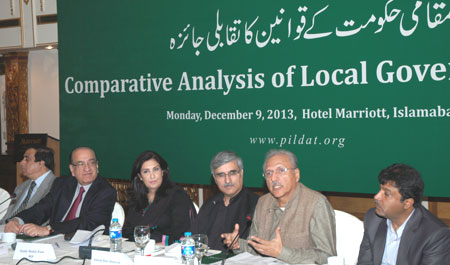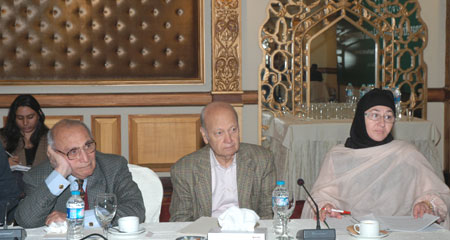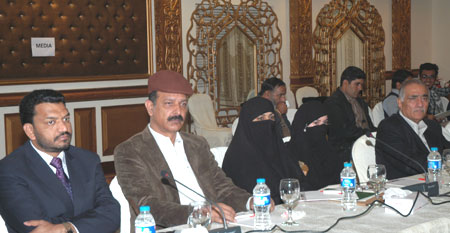|
|
| |
| EVENTS |
|
|
> Political, Fiscal and Administrative Autonomy Must for Effective Local Governments
|
|
|
| |
December 09; Speakers at the PILDAT Inter-Provincial Roundtable on Local Government Laws believed that Provincial Laws on Local Government system do not provide for adequate political, fiscal and administrative autonomy, without which local governance will remain weak. The Forum asked for a review of LG laws. |
|
| |
Speakers at the Roundtable included Mr. Shahid Hamid, Senior Advocate Supreme Court; Dr. Arif Alvi, MNA, Chief Whip PTI in the National Assembly; Dr. Shehla Raza, MPA, Deputy Speaker Provincial Assembly of Sindh and Senator Dr. Jehangir Badar. Mr. Ahmed Bilal Mehboob, President PILDAT, welcomed participants while Mr. Abdul Qadir of FES- Pakistan presented Introductory Remarks.
|
|
| |
Speaking on the occasion, Mr. Shahid Hamid said that effective local government is not possible without fiscal autonomy. Provincial Governments' role in LG system should be reduced to the level of providing policy guidelines only, adding that the current Provincial Local Government Laws provide excessive role and arbitrary powers to Provincial Governments. Mr. Hamid also advised against the excessive role provided for bureaucracy in the LG systems. Mr. Hamid said that minimum devolution of powers has been provided in the Punjab Local Government Act 2013 as key subjects such as health and education have been left under the power of the Provincial Government. Balochistan and KP seem to have struck a better balance of powers to LG systems in a relative sense, he added. He recommended that a minimum level of fiscal guarantee should be given to provinces, such as provinces should say a certain percentage of their respective budgets would be earmarked every year for the use if LG systems. He also added that some level of control on police should also be provided for in the LG laws. Commenting on the dispute resolution mechanism, he said Sindh LG law is silent on this. Delimitation, he recommended, should be dealt with by an independent Provincial Local Government Delimitation Authority, with a direct right of appeal to High Courts. The term of office for LGs, different in each province, also requires a re-think. |
|
| |
PILDAT developed a comparative analysis of 4 Provincial Local Government Acts 2013 with LGO 2001 and Kerala Acts, which was shared in the form of a paper at the Roundtable. |
|
| |
Mr. Ahmed Bilal Mehboob, President PILDAT, said that while provinces have brought respective Local Government laws but the Federal Government has not yet introduced LG laws for FATA, while the LG laws for ICT and Cantonments have only just been introduced in the Parliament. |
|
| |
Dr. Arif Alvi shared his party perspective on the LG laws. He added that since he was a member of the PM committee on LG law for Cantonments, he hoped a balance law on LG system in Cantonments has been tabled by the Government in the Parliament. He believed that Sindh offered the most restrictive law in terms of power and autonomy on Local Government. |
|
| |
Dr. Shehla Raza thanked PILDAT for the comparative analysis of LG laws and said that she will take back the reform proposals to the Sindh Assembly on Sindh LG Act, 2013. |
|
| |
Mr. Abdul Qadir said that unlike the past when local government were devised tocentralize and legitimise political powers in the centre at the expense of the elected provincial and federal tiers; there should exist no such apprehension now. Instead the local government system of the political governments needs to now open up participatory spaces for the citizens, for citizens, and to increase their access to social and political rights and enable them to hold the state directly accountable. The provinces now hold sufficient political and legislative powers and instead of encroaching it is a right opportunity to empower the local government and its functions. It will provide the opportunity for parties to strengthen their organisation at the local levels and develop political and organisation linkages between local government leadership with provincial and national leadership. |
|
| |
Sharing PILDAT's perspective at the Forum, Ms. Aasiya Riaz, Joint Director PILDAT, said that establishment of an effective Local Government system suffered inordinate delay at the hands of outgoing Governments and Assemblies between 2008-2013. The LG laws now passed by 4 provinces , largely as a result of pressure by the Supreme Court, provide a milestone just by providing for elected political ownership at the local level. However, broadly, the 4 laws are limited in scope and excessively deferential to Provincial Governments. All 4 laws largely do not provide any meaningful devolution of financial, political and administrative powers. Provinces enjoy arbitrary powers through discretionary removal of elected Local Government representatives; have arbitrary powers of inspection, leave affairs of District Councils to bureaucracy while they also have the powers to exclude areas from Local Government jurisdiction. Sharing recommendations for reform, she said that direct elections to all offices of Local Governments with necessary political process should be provided for in the Local Government system. Delimitation for LG should be undertaken by an independent body and municipal functions should be devolved to lowest tiers of LG system. Local Councils should be fiscally empowered and composition of Local Government Commissions should be balanced. Political parties elected in 2013 General Election, have largely failed to uphold their electoral pledges regarding Local Governments. Local Governments are the critical 3rd tier of Governance especially for a country the size of Pakistan. In order to effectively govern Pakistan, new and effective Local Government system, in line with Constitutional and International obligations is essential and that it enjoys political ownership. Unless political, administrative and fiscal autonomy is given to Local Government systems across the country, Parliament and Provincial Assemblies will be unable to effectively discharge their functions of representation, legislation and oversight.
Senator Mohsin Leghari said that as an ardent supporter of effective LG system, he believes that a periodicity and time-frame of Local Government system should be Constitutionally set. He shared a constitutional amendment he has moved in the Senate to provide for a time limit of 45 days of Local Government election across Pakistan within holding of General Election.
Members of Parliament, citizens, media representatives and analysts joined the Roundtable. |
|
| |
|
|
| |

|
|
| |
|
|
| |

|
|
| |
|
|
| |

|
|
| |
|
|
| |

|
|
| |
|
|
| |

|
|
|
|
|
|
|
|
|